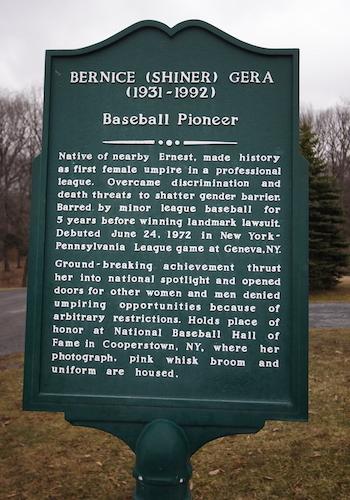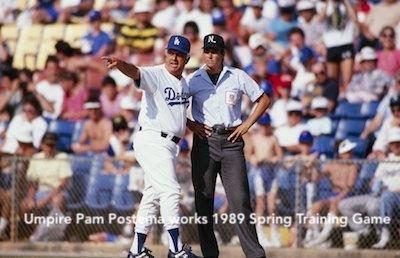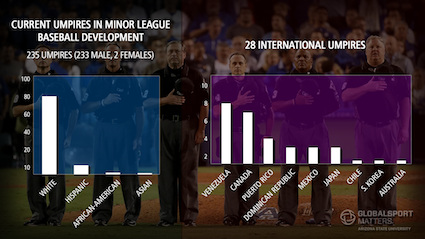 In 1967, a woman named Bernice Gera enrolled in a Florida umpiring school. Gera worked as a secretary, but she was also a longtime baseball enthusiast who had grown up playing the game and taught it to neighborhood children near her home in New York City. After graduating from umpiring school, Gera was assigned to work in the Class-A New York-Pennsylvania League, but then received a terse telegram of rejection from the president of the National Association of Professional Baseball Leagues.
In 1967, a woman named Bernice Gera enrolled in a Florida umpiring school. Gera worked as a secretary, but she was also a longtime baseball enthusiast who had grown up playing the game and taught it to neighborhood children near her home in New York City. After graduating from umpiring school, Gera was assigned to work in the Class-A New York-Pennsylvania League, but then received a terse telegram of rejection from the president of the National Association of Professional Baseball Leagues.
What followed were five years of protracted court battles -- until finally, in the spring of 1972, Gera was permitted to become the first female umpire in professional baseball history. That June, after being berated by a manager for reversing a double-play call, an exhausted Gera resigned between games of a doubleheader, citing the lack of cooperation from her fellow umpires.
 "I could beat them in the courts, but I can't beat them on the field," Gera reportedly lamented to her husband.
"I could beat them in the courts, but I can't beat them on the field," Gera reportedly lamented to her husband.
Fifty years later, a number of other women have followed in Gera's footsteps, including a pair currently working the minor leagues who are hoping to work their way up the ladder, level by level. But even as both the NFL and NBA have employed female officials in recent years, a woman has yet to make it to the major leagues. Pam Postema, who umpired from 1977-89 and made it to the Triple-A level, came the closest. And at a moment when the power dynamics of traditionally male-dominated industries are being rethought, the questions remain: When will a female finally umpire in the big leagues? And what is baseball doing to ensure that female and minority umpires are being given both the opportunities and the cooperation they need to succeed?
This is a sport that has long battled perceptions about its own insularity and lack of diversity. Those concerns have been raised in the umpiring ranks, as well: After Cuban-born umpire Angel Hernandez sued MLB last summer alleging racial discrimination in its promotion and postseason assignment policies, a Cincinnati Enquirer review of just under 100 umpires on the MLB roster revealed that roughly 10 were either African-American or Hispanic.
And while the initial hiring of umpires falls on minor-league baseball rather than the major leagues, MLB officials insist they've been doing what they can to refocus the development process.
"We do want to be reflective of our playing community and the overall community," says Peter Woodfork, MLB's senior vice president for baseball operations, who oversees umpires on a day-to-day basis. That includes, Woodfork says, an effort to find additional Hispanic umpires, but also "a big push to try to get more women."
 MLB spokesman Mike Teevan noted that Carlos Torres became the first Venezuelan major-league umpire in 2017, and that Ramon DeJesus became the first Dominican to umpire a game in 2016. But there is still a long way to go. At least part of the reason for that, MLB officials say, is due to the nature of the job itself.
MLB spokesman Mike Teevan noted that Carlos Torres became the first Venezuelan major-league umpire in 2017, and that Ramon DeJesus became the first Dominican to umpire a game in 2016. But there is still a long way to go. At least part of the reason for that, MLB officials say, is due to the nature of the job itself.
It's a long and slow grind from umpiring school to the low-level minor leagues and upward -- often up to eight or nine years. The field is constantly being culled at each level by minor-league executives and officials, and the demands of the job -- the travel required, the thick skin necessary -- serve as their own deterrents. The pair of female umpires currently in the minor-league system, Jen Pawol and Emma Charlesworth-Seiler, are "doing well" in the minors, according to MLB's director for umpire development, Rich Rieker. But they're still years away from the majors, if they're able to advance that far.
For players like the Milwaukee Brewers' Brett Phillips, it doesn't matter who is behind the plate. "If you can do the job, anyone who can do the job correctly and professionally, let ‘em do it," he said.
The fact they are women doesn't change his approach, Phillips said. "They're going to call balls on strikes. They'll call outs and safe. So if they can do a good job – which I'm sure they can – then all the power to 'em."
The good news is that Pawol and Charlesworth-Seiler at least appear to be coming up in a society -- and in a sport -- that's more accepting of diversity than what Bernice Gera dealt with. MLB officials said they haven't heard any specific complaints of sexism against either of the female umpires to date. When Pawol umpired a recent spring training game, one member of the Detroit Tigers told Woodfork they didn't think about her gender at all after the first pitch.
 Ardell, who's chronicled the history of women in baseball, says the sport is generally more welcoming to women than it once was. Women like Gera and Postema also "came through one at a time," Ardell says, which meant they had no other women to confide in, and no one to help support them. In Postema's memoir, she mentions that by the time she neared the major leagues, it was also well-known that she was a lesbian, and Ardell wonders whether homophobia may have also played a role in her failure to make the major leagues. Now, MLB has a vice president dedicated to diversity, and several other programs focusing specifically on the inclusion of women, minorities, and the LGBT community.
Ardell, who's chronicled the history of women in baseball, says the sport is generally more welcoming to women than it once was. Women like Gera and Postema also "came through one at a time," Ardell says, which meant they had no other women to confide in, and no one to help support them. In Postema's memoir, she mentions that by the time she neared the major leagues, it was also well-known that she was a lesbian, and Ardell wonders whether homophobia may have also played a role in her failure to make the major leagues. Now, MLB has a vice president dedicated to diversity, and several other programs focusing specifically on the inclusion of women, minorities, and the LGBT community.
"We live in quite a different time now," Ardell says.
In an attempt to better reflect those times, MLB is planning to offer more free umpiring clinics in the hopes of drawing women and people of color, and is even offering scholarships to promising candidates to their prospect development camp and umpiring schools. (In May, they'll hold a clinic at the MLB Urban Youth Academy in Kansas City.) They've also tried to encourage women in particular -- many of whom may have been drawn to softball umpiring in the past -- to give baseball a shot.
"We're starting to see the payback," Rieker says. "It takes a long time to turn it over. It's slow going, but it's starting to pay off."
For Phillips' teammate Lorenzo Cain, he agreed it's a long time coming for more non-white male representation behind the plate. "When things are one way so long, and now things are slowly turning whether it is playing baseball or umpiring more it's just a slow change. It'll eventually get there."
But one thing likely won't change for Cain. "I never really focused on the umpires," he said with a laugh.
Colton Dodgson contributed. Michael Weinreb is a freelance writer for several outlets, and is working on a book about football as it relates to the evolution of American culture.
More From GlobalSport Matters:
-- Ramadan Puts Elite Athlete Training Regimen To The Test
-- What Is The Color Of Hockey?
-- Athlete Activism Is On The Rise, But So Is The Backlash
-- Like Mother, Like Daughter: Title IX Trailblazers Watch Daughters Take The Stage





